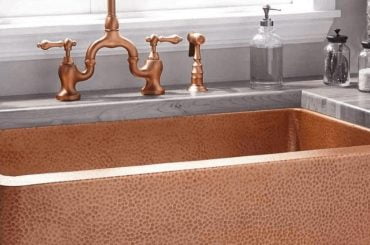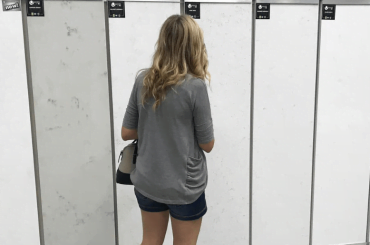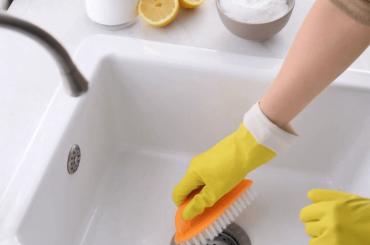When your kitchen sink smells like sewage, it’s more than just an unpleasant odor. It can be a sign that something is wrong with your plumbing and needs to be fixed right away.
In this blog post, we’ll explain why your kitchen sink might smell like sewage and what you can do to get rid of the smell. We’ll also share some tips on how to prevent the smell from happening in the first place. Keep reading to learn more!
Why Does My Kitchen Sink Smell Like Sewage?
Most of the time a bad smell coming from your kitchen sink is due to food particles and grease getting stuck in your drain pipes. If this is not addressed properly this gunk will eventually deteriorate into smelly sewer gas that escapes through an opening in your pipe.
Also, an accumulation of fat and other waste materials in your sink or drain can produce the same odor. Unclogging your kitchen sink from time to time will help solve this problem.
To make sure that it’s clogged pour several gallons of boiling water down the drain until the smell disappears. If you see a trickle of water coming out of the drain it means that there is still a clog.
In this case, you need to manually remove the blockage using a plunger or use a snake to dislodge it. However, sometimes the bad smell could be coming from your garbage disposal unit.
This can usually occur when people tend to put too much waste into the unit, or the grinding chamber is not cleaned regularly.
What could be causing the smell and how do you fix it?
The most common reason for a kitchen sink to smell like sewage is:
A clogged drain or a backed-up plumbing system
If you suspect that your kitchen sink is smelling like sewage due to a clogged drain or a backed-up plumbing system you will need to call a professional plumber as soon as possible. A plumber can assess the situation identify the cause of the problem and perform any necessary repairs or maintenance to fix it.
In addition to getting professional help, there are a few things that you can do on your own to help prevent your kitchen sink from smelling like sewage in the future. These include:
- Regularly clean out your sink and drain with a mixture of vinegar and baking soda
- Using a kitchen sink strainer to prevent debris from clogging up your drain
- Trying out other methods for reducing odors, such as using activated charcoal filters or using a deodorizing spray or scrub regularly
If you follow these tips, you should be able to keep your kitchen sink smelling clean and fresh for years to come.
Tips & DIY Solutions for Preventing a Smelly Kitchen Sink
By following the tips I will list down below, you can prevent your kitchen sink from smelling in the first place.
- Regularly clean your sink with soap and water. This helps remove any food debris that may be lurking in the corners of your sink and on the sides of the drain which can cause foul odors to build up over time.
- Use a kitchen sink drain cover to keep food and other debris from clogging the drain. This is especially important if you have small children or pets who may be prone to dropping food in the sink accidentally.
- Run hot water down the sink after use which can help flush out any lingering smells that are trapped in the pipes.
- Avoid clogging your sink by properly disposing of food waste and other items that can easily get stuck in the drain. This includes things like grease, oil, coffee grounds and eggshells.
- Regularly clean your garbage disposal with a mixture of vinegar and baking soda to remove any lingering odors and ensure that your sink stays fresh and clean.
- Use a deodorizer spray or essential oils to keep your kitchen smelling fresh at all times. This can help counteract any lingering smells and make your kitchen much more pleasant overall.
If you follow these tips, your kitchen sink will stay smelling fresh and clean for years to come. So why wait? Start implementing these tips today and be sure to enjoy the benefits of a well-kept kitchen!
DIY Solutions for Fixing a Smelly Kitchen Sink
Some DIY solutions for fixing a smelly kitchen sink include:
- Use Baking Soda: Cleaning the sink regularly with a mixture of baking soda and water can help to remove food debris and odors that may be building up in the sink over time.
- Use vinegar or citrus peels: Adding vinegar or citrus peels to the water in your sink can also help to neutralize any lingering smells or bacteria.
- Essential Oil: You can also consider adding a few drops of essential oils, such as lavender or tea tree oil to your sink to help freshen up the space and remove unpleasant odors.
- Use Bleach: If your smelly kitchen sink is caused by mold or bacteria, you may need to take more drastic measures such as using a bleach solution or installing a drain filter to keep the buildup at bay.
- Call Professional: Finally, if none of these DIY solutions seem to be working, it may be time to call in a professional plumber or kitchen sink repair specialist who can help you identify and address the root cause of your smelly kitchen sink problem.
Professional help if the problem is too big or complex to solve on your own
Whether you are dealing with mold, bacteria, or some other issue in your sink, it is important to address the problem quickly and effectively.
Working with a professional plumber or sink repair specialist can help ensure that your smelly kitchen sink is properly cleaned and sanitized so that you can enjoy clean, fresh-smelling water in your home!
Did You Know: Garbage Disposal Smell Like a Dead Animal
Different types of smells that your kitchen sink could be emitting
The dank unpleasant odor of sewage is just one possible smell that your kitchen sink could be emitting. Other possible smells include:
- Smells from cooking or food prep
- Mildew or mold odors
- Chemical smells from cleaning products or other household chemicals
- Musty or stale odors due to stale water or a buildup of food debris in the drain
- Rotting or decomposing smells due to clogged plumbing that is not draining properly
Regardless of the type of smell that your kitchen sink is giving off, it’s important to take action as soon as possible to prevent further damage and inconvenience. Whether this means calling a plumber for more serious issues.
1) The kitchen sink smells musty: If your kitchen smells musty, it may be due to a buildup of mold and mildew. Mold is caused by excessive moisture, which can come from leaking pipes, frequent humidity, or even poorly ventilated areas.
To combat the problem, try using a dehumidifier to reduce the amount of moisture in the air. You should also regularly clean your sink with bleach or another mold-killing product and make sure to wipe down any surfaces that may be prone to moisture buildup.
If you continue to have problems with moldy odors, it might also be a good idea to hire a professional cleaner or remodeler who can freshen up the space for you.
2) The kitchen sink smells like poop: If your kitchen sink smells like poop, there are a few possible causes.
- The first is that you have clogged pipes or drains, which can cause unpleasant odors to develop. You may need to call in a professional plumber to help clear the blockage and eliminate the smell.
- Another possibility is that your garbage disposal isn’t working properly, or that it needs to be replaced. This can also cause a bad odor to develop in your kitchen, so it’s important to address the issue as soon as possible.
- Finally, if your sink is located near your fridge or another food-prep area, you may simply be dealing with normal food or rotting waste that has built up over time and needs to be cleaned out. Try running hot water through your sink for a few minutes to see if this dislodges any of the offending items.
If none of these solutions help, it may be time to consider installing a new kitchen sink that is better equipped to handle smells and other issues.
3) The kitchen sink drain smells like rotten eggs: If your kitchen sink smells like rotten eggs, there may be a problem with your drain or pipes.
One possible cause is a buildup of organic matter in your drains, such as food waste, grease, or hair. This can produce foul-smelling gases that are released into the air whenever water passes through the sink.
To address this issue, you should try cleaning out your drains regularly using a mixture of vinegar, baking soda and hot water. You should also avoid putting greasy or fatty foods down your kitchen sink, as these can contribute to the problem.
Also Read: How To Remove Water Calcium Buildup/Deposits?
FAQs – Kitchen Sink Smell Like Sewage
How do you fix a smelly P-trap?
There are a few different ways to address a smelly P-trap including cleaning it regularly with baking soda and water using vinegar or citrus peels in the trap to help neutralize odors and adding essential oils like lavender or tea tree oil to freshen up the space.
Can I pour bleach down the drain?
While it is not recommended to pour bleach directly down a drain some people may choose to use a bleach solution or even install a drain filter to provide extra protection against bacteria and mold.
What should you never pour down the drain?
Some things that you should never pour down the drain include grease cooking oils and harsh chemicals. Always dispose of these items safely to avoid clogging your drains or causing other damage to your sink and plumbing system.
Can sewer gas come up through drains?
Yes, sewer gas can come up through drains in your kitchen sink. The most common cause of this problem is a blockage or backup in the main sewage line that can allow odors and gases to escape from pipes or vents.
Can you pour bleach down a smelly drain?
You could but it might not help. Clogged drains tend to smell because they are covered in organic waste and biofilm commonly called goop. As this stuff rapidly decomposes it releases foul odors into your sink or tub.
There is no quick fix for a clogged drain that smells bad. You may be able to remove some of the odor by pouring bleach down the drain, but it might not help much.
You can use special drain-cleaning products or try more natural solutions like baking soda, vinegar, or potassium hydroxide.
Wrap Up
There are several reasons why your kitchen sink might smell like sewage. The most common reason is that there is a blockage in the P-trap which is designed to prevent sewer gas from entering your home. This can be caused by food waste buildup, grease, or soap scum.
If you notice your sink starting to smell bad, take action right away and clean out the P-trap to prevent further damage. It is better you should also run hot water through your disposal for 30 seconds each week.





